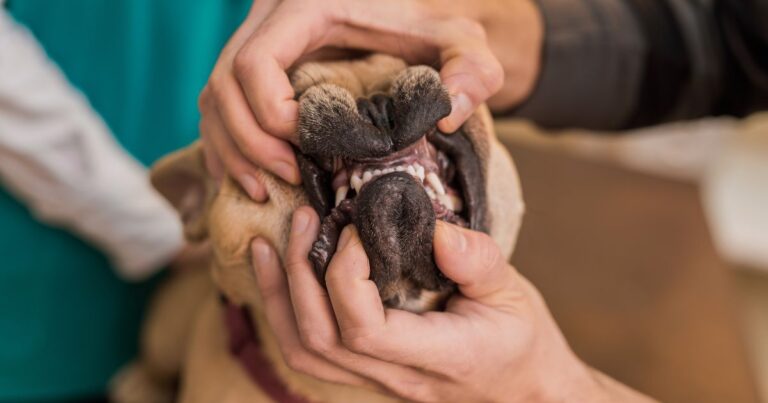French Bulldog Hip Dysplasia
Table of Contents
French Bulldog Hip Dysplasia
| Symptoms | Possible Causes | Treatment Options |
|---|---|---|
| Difficulty standing up or climbing stairs | Genetic predisposition | Lifestyle modifications |
| Decreased activity | Rapid weight gain | Pain management |
| Loss of thigh muscle mass | Poor diet | Surgery |
| “Bunny hopping” gait | Lack of exercise | Physical therapy |

“French Bulldog Hip Dysplasia” – sounds like a mouthful, doesn’t it? Well, it’s a condition that can affect our adorable Frenchies. But don’t fret! This article will unravel the mystery behind it, offering insights and tips to keep your Frenchie’s tail wagging happily!
Introduction
If you’re a French Bulldog owner or considering becoming one, it’s crucial to understand the health challenges this breed can face, particularly hip dysplasia. French Bulldogs, affectionately known as Frenchies, are a popular breed known for their charming personalities and distinctive bat-like ears. However, like many purebred dogs, they are prone to certain health issues, one of which is hip dysplasia. This condition can affect a Frenchie’s quality of life, so it’s essential to be informed about it.
Dogs do speak, but only to those who know how to listen.
Hip dysplasia is a common health issue in many dog breeds, but what does it mean when it comes to our beloved Frenchies? In simple terms, hip dysplasia is a deformity of the hip joint that occurs during a dog’s growth period. This can lead to painful arthritis or even lameness if left untreated. But don’t worry, as a Frenchie owner myself, I’m here to guide you through everything you need to know about this condition.
Signs of Hip Dysplasia in French Bulldogs
- Difficulty standing up or climbing stairs
- Decreased activity
- Loss of thigh muscle mass
- “Bunny hopping” gait

Understanding Hip Dysplasia
While hip dysplasia can seem like a random health issue, it’s often the result of specific factors. It’s primarily a genetic condition, meaning it’s passed down from parent dogs to their puppies. However, environmental factors such as diet, exercise, and rapid weight gain can also contribute to the development of this condition.
Causes of Hip Dysplasia
- Genetic predisposition
- Rapid weight gain
- Poor diet
- Lack of exercise
Recognizing the signs of hip dysplasia early can make a world of difference for your Frenchie’s comfort and health. Symptoms can vary from dog to dog, but common signs include difficulty standing up or climbing stairs, decreased activity, loss of thigh muscle mass, and a noticeable “hop” or “bunny hopping” gait.
Factors Contributing to Hip Dysplasia
| Genetic Factors | Environmental Factors |
|---|---|
| Breed predisposition | Rapid weight gain |
| Parent dogs with hip dysplasia | Poor diet |
| Size and weight of the breed | Lack of exercise |

Diagnosis and Treatment
If you suspect your French Bulldog might be suffering from hip dysplasia, it’s important to seek veterinary care for a proper diagnosis and treatment plan. Diagnosis typically involves a physical examination and X-rays to assess the condition of your Frenchie’s hips. Treatment can range from lifestyle modifications and pain management to surgery in severe cases.
While hip dysplasia can be a daunting health issue, there are steps you can take to help prevent it and ensure your Frenchie lives a comfortable, happy life. Regular exercise, a balanced diet, and regular vet check-ups can all contribute to your Frenchie’s overall health and help prevent hip dysplasia.
Prevention Tips for Hip Dysplasia
| Diet | Exercise | Regular Check-ups |
|---|---|---|
| Balanced and nutritious | Regular, low-impact activities | Regular vet visits for early detection |
Treatment Options for Hip Dysplasia
- Lifestyle modifications
- Pain management
- Surgery
- Physical therapy

Personal Insights on Hip Dysplasia
While my own Frenchie, Croissant, has been fortunate to stay healthy and free from hip dysplasia, I’ve spent considerable time researching and understanding this condition. Through my interactions with other French Bulldog owners and experts, I’ve gained insights into the challenges and triumphs they’ve faced in managing hip dysplasia. Their experiences underscore the importance of early detection, proper care, and a whole lot of love.
Hip dysplasia is a serious health issue, but with knowledge and proactive care, you can help your Frenchie lead a happy, comfortable life. Remember, every dog is unique, and what works for one Frenchie may not work for another. Always consult with your vet to determine the best course of action for your furry friend.
The dog is a gentleman; I hope to go to his heaven, not man’s.
Mark Twain
Conclusion
In conclusion, while hip dysplasia is a common health issue in French Bulldogs, it doesn’t have to be a life sentence. With early detection, proper treatment, and a whole lot of love, Frenchies with hip dysplasia can lead happy and fulfilling lives. As Frenchie owners, it’s our responsibility to stay informed about potential health issues and to provide the best care possible for our furry friends.
For more information on French Bulldog health and care, check out my other articles in the Health and Care category. Also, don’t forget to read my cornerstone page on French Bulldog health issues for a comprehensive overview of the challenges this breed may face.
Also check out my other posts in this series: French Bulldog Brachycephalic Syndrome and French Bulldog Skin Problems
Remember, “The greatness of a nation and its moral progress can be judged by the way its animals are treated.” – Mahatma Gandhi. Let’s treat our Frenchies with the love and care they deserve.
Disclaimer: This article is intended for informational purposes only. It’s not intended to be a substitute for professional veterinary advice, diagnosis, or treatment. Always seek the advice of your veterinarian or other qualified health provider with any questions you may have regarding a medical condition.
Frequently Asked Questions
What is French Bulldog Hip Dysplasia?
French Bulldog Hip Dysplasia is a genetic condition where there’s an abnormal formation in the hip socket, leading to discomfort, pain, or even lameness in severe cases.
Are all French Bulldogs prone to Hip Dysplasia?
While Hip Dysplasia is common in French Bulldogs due to their genetic predisposition, not all Frenchies will develop this condition. Factors like diet, exercise, and overall health can influence its occurrence.
What are the symptoms of Hip Dysplasia in French Bulldogs?
Symptoms can include difficulty in standing up or climbing stairs, decreased activity, loss of thigh muscle mass, and a noticeable “hop” or “bunny hopping” gait.
How is Hip Dysplasia diagnosed in French Bulldogs?
Diagnosis typically involves a physical examination and X-rays by a vet to assess the condition of your Frenchie’s hips.
What is the treatment for Hip Dysplasia in French Bulldogs?
Treatment can range from lifestyle modifications and pain management to surgery in severe cases. It’s crucial to consult with a vet to determine the best course of action.
Can Hip Dysplasia in French Bulldogs be prevented?
While you can’t control the genetic aspect, maintaining a healthy weight, providing a balanced diet, and regular exercise can help reduce the risk of developing Hip Dysplasia.
Can a French Bulldog with Hip Dysplasia live a normal life?
Absolutely! With early detection, proper treatment, and a lot of love, Frenchies with Hip Dysplasia can lead happy and fulfilling lives.
How can I support my French Bulldog if they have Hip Dysplasia?
Regular vet check-ups, a comfortable living environment, and a diet that supports joint health can all contribute to your Frenchie’s overall comfort and well-being.
How do I know if my French Bulldog has hip dysplasia?
Signs of hip dysplasia in French Bulldogs can include difficulty in standing up or climbing stairs, decreased activity, loss of thigh muscle mass, and a noticeable “hop” or “bunny hopping” gait. If you notice these symptoms, it’s best to consult with a vet.
How do you fix hip dysplasia in Frenchies?
Treatment for hip dysplasia can range from lifestyle modifications and pain management to surgery in severe cases. It’s crucial to consult with a vet to determine the best course of action.
What are the first signs of hip dysplasia in dogs?
The first signs of hip dysplasia can include difficulty in standing up or climbing stairs, decreased activity, and a noticeable change in gait, such as “bunny hopping”.
How do you prevent hip dysplasia in Frenchies?
While you can’t control the genetic aspect, maintaining a healthy weight, providing a balanced diet, and regular exercise can help reduce the risk of developing Hip Dysplasia.
What age do French Bulldogs get hip dysplasia?
Hip dysplasia can develop at any age, but symptoms often begin to appear when a dog is a young adult. Regular vet check-ups can help detect the condition early.
Can you walk a dog with hip dysplasia?
Yes, but it’s important to keep walks gentle and avoid strenuous activity. Swimming can be a great low-impact exercise for dogs with hip dysplasia. Always consult with your vet about the best exercise routine for your Frenchie.






